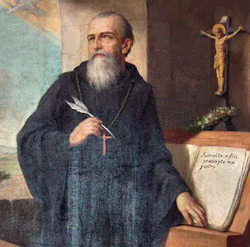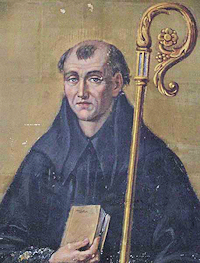Easter: April 17th
Wednesday of the Third Week of Easter
Other Commemorations: St. Robert of Molesme, Abbot (RM)
» Enjoy our Liturgical Seasons series of e-books!
The Roman Martyrology commemorates St. Robert Molesme (1027-1110), traditionally considered to be the founder of the Cistercians, the reform that developed at Citeaux.
Meditation for Wednesday in the Third Week of Easter
"A little while"
1. "Yet a little while," for you are only pilgrims and strangers on earth. The liturgy wishes to center our attention and our efforts on what is right and enduring, and on those things in which we can find true peace. That alone has permanent value
2. "Yet a little while". Everything that exists on earth is temporal and passing. Our goods, our pleasures and our joys, our health, beauty, strength, youth, wealth, honors, friendships, even our suffering and misfortune, are of short duration and soon pass away. Man's life on earth is like a gust of wind, and his "days (are] measureable" (Ps. 88:6). "All flesh is grass, and all the glory thereof as the flower of the field. The grass is withered, and the flower is fallen because the spirit of the Lord hath blown upon it" (Isa. 40:6 f.). Every creature on earth bears this stamp on its forehead, "yet a little while." Why do we cling to the things of this earth? Why do we rely on them so persistently? What peace can we find in them? We are pilgrims on the earth for "a little while." He who can grasp this truth understands life. He who heeds this warning of our Lord, need fear no evil, for he can weather every storm. He is a pilgrim and a stranger, and is left undisturbed by the uneasy ebb and flow of life. We are "deceivers, and yet true; as unknown, and yet known; as dying, and behold we live; as chastised and not killed; as sorrowful, yet always rejoicing; as needy, yet enriching many; as having nothing and possessing all things" (II Cor. 6:8-10).
Only one thing is permanent, our faith and our hope. "I will see you again, and your heart shall rejoice, and your joy no man shall take from you". The true Christian, the Christian who has risen with Christ, lives by faith and in the hope of those things that are to come. "I believe in life everlasting."
"But our conversation is in heaven; from whence also we look for the Savior, our Lord Jesus Christ, who will reform the body of our lowness, made like to the body of His glory, according to the operation whereby also He is able to subdue all things unto Himself" (Phil. 3:20 f.). Our Lord is already preparing Himself for His ascension into heaven. "Let not your heart be troubled. You believe in God, believe also in Me. In My Father's house there are many mansions. If not, I would have told you; because I go to prepare a place for you. And if I shall go and prepare a place for you, I will come again and will take you to Myself, that where I am you also may be. And whither I go you know, and the way you know.... I am the way, the truth, and the life" (John 14:1 ff.). "Heaven and earth shall pass, but My words shall not pass" (Matt. 24:35). "The word of our Lord endureth forever" (Isa. 40:8).
3. Our souls must meditate on our heavenly home that they may become strong. Only when buoyed up by such thoughts will they maintain the proper attitude and become strong enough to overcome the world, to despise worldly things, and remain true to their ideals. By virtue of this strength, Christians live for the future. They long for martyrdom, and with St. Paul they desire "to be dissolved and to be with Christ" (Phil. 1:29). They rejoice at the privilege of being allowed to suffer for their faith. "If you be reproached for the name of Christ, you shall be blessed; for that which is of the honor, glory, and power of God, and that which is of His Spirit, resteth on you (I Pet. 4:14).
"But the things that were gain to me, the same I have counted loss for Christ. Furthermore, I count all things to be but loss for the excellent knowledge of Jesus Christ my Lord; for whom I have suffered the loss of all things and count them but as dung that I may gain Christ. . . . That I may know Him and the power of His resurrection and the fellowship of His sufferings, being made conformable to His death. If by any means I may attain to the resurrection which is from the dead....Forgetting the things that are behind and stretching forth myself to those things that are before, I press towards the mark to the prize of the supernal vocation of God in Christ Jesus" (Phil. 3:7 ff.).
—Benedict Baur, OSB, The Light of the World, Vol. 2
St. Robert of Molesme
 St. Robert was born in 1027 near Troyes, Champagne, France, of noble birth. At age 17 he entered the Benedictine Abbey Montier-la-Celle, quickly rising to be prior of the abbey. He was made Abbot of Saint-Michel-de-Tonnerre in 1070, but considered it to have lax standards and the monks were quarrelsome, so he returned to Montiers-la-Celle. The same year he was placed over the priory Prior of Saint-Ayeul Abbey, which was connected to Montiers-la-Celle.
St. Robert was born in 1027 near Troyes, Champagne, France, of noble birth. At age 17 he entered the Benedictine Abbey Montier-la-Celle, quickly rising to be prior of the abbey. He was made Abbot of Saint-Michel-de-Tonnerre in 1070, but considered it to have lax standards and the monks were quarrelsome, so he returned to Montiers-la-Celle. The same year he was placed over the priory Prior of Saint-Ayeul Abbey, which was connected to Montiers-la-Celle.
In 1075, in an attempt to return to a simpler form of Benedictine life requested by a group of hermits from the forests around Colan, France, he helped found the monastery at Molesme, Burgundy. The group, especially Robert, gained a reputation for piety. It is because of this reputation that in 1082 St. Bruno of Cologne came to Robert seeking advice. He lived with Robert's community for a time before going on to found the Grande Chartreuse, the first Carthusian monastery. , The growing reputation led to bequests of money, which led to an increase in size of the monastery, which led to internal difficulties, and suddenly there were many brothers that objected to the severe life practiced by the founders. Robert twice left to live on his own, but was ordered back to his position by the pope.
In early 1098 Robert, Saint Stephen Harding, Saint Alberic of Citeaux and 18 other monks left Molesme, and on March 21, they founded the monastery of Cîteaux near Dijon, France, with the goal of living strictly by the Benedictine Rule, strict vows of poverty, and frequent retreats; Robert served as the first abbot. However, with conditions deteriorating at the Molesme house he was re-assigned as abbot there in 1100 with a mandate to reform. The monks agreed to submit entirely to his interpretation of the Rule of St. Benedict. Molesme became a major center for the Benedictines under his tutelage. St. Albéric was made successor abbot at Cîteaux, with St. Stephen Harding as prior. St. Robert lived and worked in Molesme the rest of his life.
St. Robert is traditionally considered one of the founders of the Cistercians, the reform that developed at Citeaux.
—Adapted from Catholic Saints Info and Catholic Encyclopedia
Highlights and Things to Do:
- Read more about St Robert of Molesme:
- St. Robert's first founded Molesme Abbey, which now is only an historical monument, with a few surviving buildings. See more about the Shrine of Our Lady of Molene on that site.
- With St. Stephen Harding, St. Robert founded Citeaux Abbey. It was an activity monastery for the Cistercians (Trappists) until the French Revolution. In 1898 it was bought back by the Trappists and revitalized. More details can be read on Wikipedia.
- Read this brief guide on the Cistercian Order.
- See some art depictions of St. Robert.








